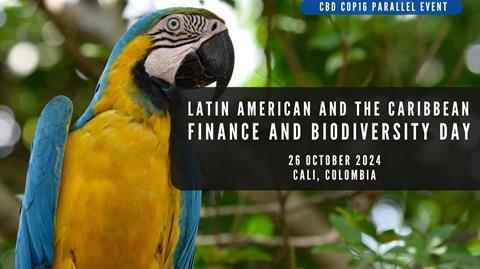
“Corporations have found ways to be heard during negotiations
on reversing the drastic global decline in plant and animal life.”
Big Ag, Pharma, Pesticides, Industries
Hope to Sway COP16 Biodiversity Talks
Hazel Healy and Rachel Sherrington / DeSmog
(October 28, 2024) — Under thundery tropical skies, and amid ever more dire warnings on the precarious state of the world’s ecosystems, the United Nations Biodiversity Conference is unfolding in Colombia.
This year’s summit, known as COP16, follows on from the last biodiversity conference held in Montréal in 2022, when negotiators struck an historic deal – the equivalent of the Paris Agreement on climate change – to “halt and reverse” nature loss.
Now, government representatives from nearly 200 countries, along with scientists, Indigenous groups, and environmental activists, are gathered in the southern city of Cali to negotiate how to put this plan into action: protect earth’s habitats and the people who depend on them.
Joining them in Colombia are delegates and observers from powerful industry groups, which represent the companies whose operations are actively depleting the natural world. They range from the pesticide and biotechnology trade group CropLife International, to the commodities giant Bunge. Oil and gas majors such as ExxonMobil and Shell have sent staff to the summit, as have pharmaceutical giants such as GSK, and the multinational mining company Anglo American (see map, below).”
Some of these groups have lobbied against regulations to protect nature. The agrochemicals industry helped defeat EU pesticide-reduction reforms aimed at protecting its plummeting bird and bee populations. Major soy and grain traders blocked the EU deforestation regulation.
There are many points of contention at this year’s negotiations. Environmental and rights groups are calling for a strong agreement that finds ways to regulate and limit sectors like industrial agriculture, the leading cause of biodiversity loss worldwide. This approach prioritises putting those most affected by nature loss – such as Indigenous peoples, local, and Afro-descendent communities – in the driving seat of conservation.
A weaker outcome would let “business as usual” go on. Under this scenario, COP16 could broker an agreement that favours voluntary commitments from business, emphasises using high-tech and complex financial instruments to stem nature loss, and allows pharmaceutical companies to continue earning billions from using nature’s genetic data for free.
Often perceived as the little sister to the more high-profile UN climate process, the biodiversity summits so far are seen as being better protected from corporate influence. But some environmental groups have concerns that this is starting to change.

Corporate Presence Grows
Corporations have turned out in large numbers at COP16, as they did at the last biodiversity summit in 2022. Compared to climate summits, where corporate logos and lobbyists are more visible, here they are flying under the radar. Yet they have found ways to tap into the negotiations.
DeSmog’s map of business participation in COP16 reveals the presence of a range of powerful industry associations and multinationals from the agriculture, pharmaceuticals, finance, mining, and fossil fuels sectors.
They include mixed trade groups such as Brazil’s Confederation of National Industry (CNI), which represents powerful Brazilian agri-interests, and has been explicit about its intentions to lobby for its member interests during COP16.
Some individual corporations are participating through such trade groups. This has been the route into the summit for Suzano, a major player in the pulp and paper industry, which causes large-scale forest destruction. Other companies present from industries that take a heavy toll on nature include dairy giant Danone and fertiliser company Yara, along with Rabobank, which is a major investor in industrial farming.
Banks that finance biodiversity destruction are at COP16, as well as those that are seeking to “monetize biodiversity” by creating new markets for biodiversity offsets, and companies looking for business opportunities in these emerging markets.
The map also shows the participation of conservation and industry coalition Business for Nature, which encourages the private sector to fall into step with biodiversity targets, and the voluntary Taskforce on Nature Related Disclosures (TNFD) initiative. Both have notable presences at the summit.
“The involvement of business representatives at COP16 can be a double-edged sword,” said Oscar Soria, director of the think tank Common Initiative. “While their participation brings critical financing and innovation potential, it also brings risks.
“If the voices of Indigenous leaders, civil society, and biodiversity experts are sidelined,” said Soria, “there’s a danger that the integrity of biodiversity commitments could be compromised by greenwashing or profit-driven solutions that don’t address the systemic causes of biodiversity loss. It’s up to the states to bring a balance.”

Influence Over Negotiations
As the meeting heads into its second week, on the table are negotiations over payments for nature’s genetic data, how to measure progress against conservation targets, and how to fill the yawning finance gap for nature restoration – without which poorer countries cannot act.
While much lobbying took place before national ministers arrived in Colombia, COP16 itself has offered a gamut of fresh opportunities for businesses to weigh in on words in the negotiating text, share their talking points, and advocate their preferred solutions at side events, receptions, and dinners.
Some corporate representatives are attending as “country delegates”, which enables insider access to the negotiations. The delegations of Switzerland and Japan, for example, were expected to include representatives from the pharmaceutical sector, which is a major part of the economy in both nations.
The International Federation for Pharmaceutical Manufacturers and Associations, a major trade group in attendance at COP16, has strongly opposed a proposed 1 percent levy on profits gleaned from accessing genetic information, intended to channel income to communities at the sharp end of protecting nature.
The conservation arm of the Keidanren, Japan’s leading voice for business – also on the ground in Cali – has explicitly stated that any contributions should be voluntary.
Corporations have also found common cause with major producer countries when it comes to agriculture, the leading driver of biodiversity loss worldwide. The interests of trade groups featured in the map – such as the Brazilian Business Council for Sustainable Development (CEBDES) and Confederation of National Industry (CNI), along with fertiliser and pesticide trade groups – appear to overlap with those of major meat-exporting countries such as Brazil and Argentina, which have battled to keep industrial production in the negotiating text of the biodiversity agreement.
Observers say that at the 2022 summit in Montréal, these Latin American meat powerhouses forced the phrase “sustainable intensification” into the text. The term is strongly supported by agri-interests as it underpins the idea that industrial farming can continue to grow while causing less environmental damage. Agro-ecology, a deeper and transformative shift to nature-friendly farming, ended up taking second place in the text.
With UN agreements, the devil is the details – which in draft texts sit in square brackets denoting areas of disagreement. The climate group Carbon Brief documented 3,071 such brackets in COP16 negotiating documents as of 24 October.
Along with membership in country delegations, industry is also attending COP16 as part of observer groups – putting them shoulder to shoulder with longtime civil society participants. Observers are able to attend “contact groups”, a type of breakout session held to help build consensus when negotiations become deadlocked.
It’s in these settings that the pesticide industry can push its preferred positions on what metrics will be used to track progress towards reaching nature protection goals. CropLife has called for softer “risk management measures” for agrochemicals, in the hope of unseating the current text’s metric requiring countries to report on volume and cumulative toxicity of pesticides used.
As of Monday, the pesticides target was under serious threat according to observers, though many countries have signalled their intention to defend it.
In the two years between summits, business groups have also joined advisory groups known as “Ad Hoc Technology Groups” (Ahtegs), which draft documents and guidance that inform later negotiations.
Responding to a request for comment, CropLife International said, “The private sector holds a crucial role and responsibility in the implementation of the UN Convention on Biological Diversity, working to create and deploy scalable, sustainable agriculture solutions that preserve biodiversity, mitigate climate impact and provide enough food to those who need it”.

‘Offsetting’ Nature Destruction
Another way that industry groups are exerting influence at COP16 is by pushing business-friendly fixes to saving and restoring biodiversity. The environmental advocacy group Friends of the Earth brands many of these approaches as “false solutions” that avoid tackling the root causes of nature destruction.
One popular topic at COP16 is biodiversity offsets or credits, which are defined by Carbon Brief as “a system for placing a value on a habitat, plant or animal, meaning the ‘credit’ or ‘unit’ can be bought or sold to ‘offset’ damage being done” elsewhere.
The idea is supported by many large conservation organisations, which see biodiversity credits as a way to raise private funds for cash-strapped communities trying to implement environmental conservation or restoration projects.
“It’s a convincing narrative and they push it everywhere,” noted one observer with a civil society group, “a way to avoid regulation” that will allow sectors like agribusiness and mining continue their destructive practices.
Offsets are far from universally supported, however. Some Amazonian Indigenous communities have dubbedWestern offset companies “carbon pirates”, while a coalition of civil society organisations including Avaaz, Friends of the Earth, and Greenpeace believe that “the promise of restoration should never be used to allow destruction elsewhere”.
On the ground in Cali, Colombian farmer’s representative Noraldo Diaz Ordoñez is wary that offsets will erode the land rights of communities. “They come with these biodiversity offsets”, he said. “They destroy on one hand with their projects and then offer up some small change, to clean up their image, acting as saviours. But the commitment needs to be that the land belongs to us. The farmers, Indigenous people. Not to toxic agriculture, or mining companies”.
Offsets, and accompanying ideas like “net nature positive”, have been appearing all over the COP16 programme, along with booths run by companies offering the accompanying kit needed to “count” nature, such as drones, big data, and satellite technology.
Also in attendance are established carbon offsetting companies – such as South Pole, which spoke at a side event in Cali and plans to move into biodiversity credits. Another company attending the meeting, standards-setter Verra, was the subject of a major investigation questioning the integrity of carbon offsets in 2023.
Business Opportunities
With the funding gap for global conservation efforts estimated at $700 million annually, new markets and products linked to biodiversity have caught the attention of the banking sector.
Bloomberg has reported that several global banks, such as JP Morgan, are attending the biodiversity summit for the first time. The new product opportunities for banks include buying government debt with “green bonds” to generate funding that allows countries to invest in conservation projects.
Newer, more agile financial institutions are also attracted by the promise of biodiversity-related finance products. A private equity firm called the Landbanking Group, which joined food giant Nestlé at a side event, openly advertises that its work can help “extend the operating licence” of large industrial projects.
However, some say that private finance will not be a “silver bullet” for filling the biodiversity funding gap. Oscar Soria, from Common Initiative, advocates re-directing the $500 billion in public funds that prop up destructive industries such as fossil fuels and industrial agriculture, as stated in agreement adopted at COP15 in 2022.
“Repurposing harmful subsidies, especially those that fuel environmental degradation, would directly address the root causes of biodiversity loss,” he said. “Countries should follow that framework if they’re serious about protecting their economies, since half of the world’s economy depends on biodiversity.”

Corporate Narratives Take Center Stage
Industry groups have been active on side panels and events during COP16, in both the “Blue Zone,” which is limited to UN-registered and accredited attendees, and the public “Green Zone” located in central Cali.
The International Petroleum Industry Environmental Conservation Association (IPIECA), whose members represent 60 percent of the world’s total oil production, has been bringing large numbers of fossil fuel company representatives to UN biodiversity summits since they began in 1994.
In 2022, IPIECA brought in 33 delegates to COP15, including representatives of Shell, the Malaysian national oil company Petronas, and Canadian tar sands extraction company SunCor. It is not yet known how many delegates the group has brought to COP16.
One event co-hosted by IPIECA in Cali showcased small-scale projects that oil companies have been undertaking to protect biodiversity in Colombia, Papua New Guinea, and Canada. The featured speakers represented ExxonMobil, Shell, and Ecopetrol, Colombia’s largest oil company.
Oil, gas, and mining concessions pose major threats to global biodiversity and Indigenous lands, and global warming impacts such as drought and forest fires are major drivers of the biodiversity crisis. Neither topic was broached during the session, however.
Elsewhere on the COP16 agenda, Nestlé – which has emissions three times the size of its home country Switzerland – spoke at a side event showcasing projects involving “regenerative agriculture”, a vague term that companies have begun adopting in their public sustainability plans.
It’s a tactic that companies have long used at annual climate summits: touting their sustainability credentials without acknowledging the harms caused by their operations.
“You can see industry is here from all these side events,” said Marciano Toledo de Silva, of the Movement of Small Growers in Brazil, gesturing towards the conference centre monitors scrolling through the programme. “They come disguised as foundations and all sorts. The private sector involvement in the multilateral system is a problem – it’s unacceptable.”
Bruna Campos, oil and gas campaigner at the Center for International Environmental Law (CIEL), said the presence of fossil fuel corporations at COP16 was “extremely problematic” and was leading to “vested interests dominating the agenda.”
The summit “is meant to be about people and making peace with nature,” she said, “and yet negotiators are avoiding acknowledging the impact of oil and gas on ecosystems, biodiversity, Indigenous peoples and communities.”
Melissa Lem, president of the Canadian Association of Physicians for the Environment, shared Campos’ view. “Historically they are the ones who are obstructing progress,” she said. “Even now we’re seeing fossil fuels walk back on commitments to renewables. They’ve shown over and over again their interest is not in our health or our environment.”
IPIECA was approached for comment.

Industry Focus on Voluntary Initiatives
Industry-led projects aimed at moving the private sector towards nature protection have also had a presence in Cali.
These include the Taskforce on Nature Related Disclosures (TNFD), one of the most influential reporting initiatives to have cropped up as shareholders and investors show a growing interest in biodiversity. Some 400 companies have signed on to TNFD.
At a baseline level, the TNFD only requires companies to report on the risks that nature degradation poses to their business – such as through rising costs of raw materials or the scarcity of freshwater. Participants that choose to report beyond the baseline also contribute information about the impact of their operations on nature.
While TNFD has been widely embraced in the corporate realm, campaigners say this approach is insufficient, and have raised a litany of concerns about the initiative.
By allowing self-reporting by extractive corporations, some activists contend, TNFD could become another vehicle for misleading the public and investors about human rights and environmental abuses caused by the operations of mining firms such as Vale and Rio Tinto, which have both adopted the TNFD framework.
The Rainforest Action Network has filed a complaint with the United Nations Environment Programme over its support for TNFD. “In all my years of activism I have never heard an Indigenous person say what is needed is more corporate self reporting”, said RAN’s Shona Hawkes during a press conference. The group wants the rights of forest peoples to be centred in mandatory reporting frameworks, rather than industry preferences.
Activists have also pointed out that despite a range of corporate disclosure initiatives, the financing of biodiversity destruction continues to rise. A report released in early October by the Forests & Finance environmental coalition found that in the last 18 months, $77 billion had flowed into “forest-risk sectors”.
In response to a request for comment, a TNFD representative stated that Rainforest Action Network’s recent complaint was a good example of how its disclosure system could be used to better hold companies to account for their impacts, while acknowledging that tougher mandatory measures were also needed.
“We do not review, validate or certify the reporting produced by companies,” the spokesperson said. “Assessing the quality and completeness of an organisation’s disclosures is up to investors and other stakeholders.”
Business for Nature (BfN), another influential initiative to encourage private sector involvement, has also been active at COP16. The group is a coalition of large conservation groups, such as WWF, the Nature Conservancy, and International Union for Conservation of Nature (IUCN), and corporate partners such as the World Business Council for Sustainable Development (WBCSD), an environment-focussed trade group.
Many of the corporations in the WBCSD have lobbied against stronger environmental protections at national and regional levels.
It is not yet known who is in WBSCD’s delegation to COP16. But In 2022, the group brought over a hundred delegates to COP15, including representatives from oil major Shell, the multinational food company Cargill, pharmaceuticals company GSK, and Drax, a UK bioenergy company that has received billions in government green subsidies.
In a February broadcast, BBC Panorama linked Drax to the destruction of primary forests in Canada. Drax denied the claims, saying that its wood pellets were “sustainable and legally harvested”.
A 2022 Friends of the Earth report criticised some of the umbrella groups attending UN biodiversity summits, including Business for Nature and WBCSD, for relying on voluntary solutions and schemes over stronger regulations to decisively halt destructive business practices.
Responding to a request for comment, Business for Nature CEO Eva Zabey agreed that “voluntary action alone is not enough” and called for governments to strengthen incentives.
“This year at COP16, over 230 leading businesses with combined revenues of $1.7 trillion have signed a joint statement calling for renewed policy ambition on nature to speed up the implementation of the Global Biodiversity Framework,” Zabey stated. “The fact that so many large companies now publicly support stronger environmental regulations represents a significant shift from historical positions.”
In response to a request for comment, a WBCSD spokesperson said that the group “is at COP16 supporting the nature agenda and business contributions to the Global Biodiversity Framework.”
They added that the WBCSD had “co-designed with Business for Nature and other partners, a set of detailed policy asks, which show how the level of ambition businesses are calling for could be implemented by governments.”
The Convention on Biological Diversity Secretariat was approached for comment.
